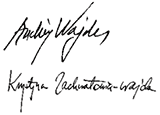髙野さんの思い出
映画監督
アンジェイ・ワイダ
ワイダ夫人
クリスティナ・ザフファトヴィチ=ワイダ
髙野悦子さんは、長い年月にわたり、私たちの心からの友だちでした。私たちの人生にとても重要な役割を演じました。映画に深く精通しておられ、東京の岩波ホールで、私の最も重要な映画群を上映してくださいました。他ならぬ彼女が私の名前を、権威ある稲盛財団の京都賞の受賞者として、ご提案されたのです。1987年にこの賞が与えられたとき、私は頂戴した賞金を、クラクフの美術館のいくつかの収蔵庫に保管されていた、日本美術品のための建築物の建造に当てることにしました。他ならぬ髙野さんが、私たちを世界的に著名な建築家・磯崎新さんに出会わせてくださったのです。彼は、将来のマンガ博物館の設計図を私たちに贈ってくださり、このことが私たちの前に企画実現のチャンスを開いたのでした。
彼女は、建築のために行われたすべての活動を見守る、幸福の女神でした。数万人の日本人の心を動かしました。日本国内で、マンガ博物館建設のための募金を企画され、建築着手の決め手となったJR東労組からの百万ドル寄金も可能にしてくださいました。もしも、日本でこの上なく高い信望を受ける髙野さんがいらっしゃらなければ、クラクフに私たち日本博物館は誕生しなかったことでしょう。
髙野悦子さんは、私たちを、古い日本(日本の伝統)に近づけてくださった方でもありました。私たちに同行して、日本の劇場・建築・絵画と出会わせてくださったのです。
その逝去は、私たちにとって取返しのつかない喪失です。
私たちは彼女のことを、大きな感謝とともに、マンガ博物館開館20周年記念式典に私たちと同席されないことへの痛恨とともに、思い出しつづけることでしょう。
Memories of Etsuko Takano
Movie director
Andrzej Wajda
Mrs
Krystyna Zachwatowicz Wajda
Etsuko Takano was a friend close to our heart for many years. She played an essential roll in our lives. She had deep understanding and profound expertise in films. My most important works were shown at Iwanami Hall in Tokyo. It was her who proposed my name to be a recipient of the prestigious “Kyoto Prize” of Inamori Foundation. When I received the prize in 1987, I decided to use the prize money for constructing a building in order to accommodate Japanese artworks which had been scattered around several museum storerooms in Krakow. It was also her who introduced us to Mr. Arata Isozaki, one of the distinguished architects in the world. He sent us a plan of future Manggha museum in Krakow, and that paved the way for us to materialize our vision.
She was our Lady Luck who kept an eye on all the efforts to build the museum. Tens of thousands of Japanese people were moved by her enthusiasm. She organized a fund-raising campaign in Japan to establish Manggha museum in Krakow. She also brought about a million dollar donation from East Japan Railway Worker’s Union, by which construction begun at last. She was highly respected and trusted among people in Japan. If it had not been for her, Japan Center in Krakow would not have been built.
We also acquainted ourselves with old Japan (traditional Japanese culture) with her help. She accompanied us to Japanese theatres and showed us around Japanese fine arts such as paintings and architecture.
Her death was an irretrievable loss to us. We deeply regret that we will not be able to have her next to us at the twentieth anniversary of Manggha museum. Her memories will continue to stay with us with great sorrow and gratitude.
